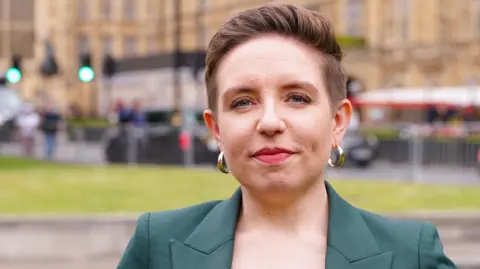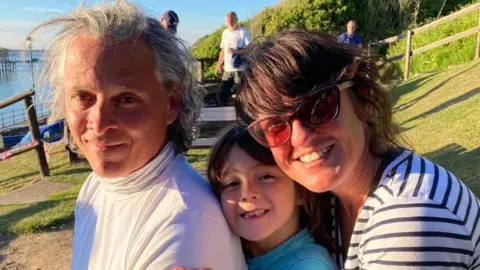Family visa rules are 'a tax on love', says MP
 Kayleigh Thys
Kayleigh ThysChildren are "bearing the brunt" of a "cruel" immigration policy which is keeping families apart, according to campaigners.
As of April 2024, a British citizen or settled resident must earn at least £29,000 to apply for a visa for their partner - up from £18,600 previously.
Children of families separated by the rule have been left "experiencing stress, anxiety, sadness, loneliness and selective mutism", according to Bristol campaigner Caroline Coombs.
The Labour government has commissioned an independent review of the policy which is ongoing.
The change was part of a package of measures set out by the previous Conservative government to reduce immigration, which included increasing the income threshold further to bring it in line with the Skilled Worker Visa.
A parliamentary debate took place on Monday after a petition against the increase was signed by more than 100,000 people.
 PA
PAMP for Bristol Central and co-leader of the Green Party, Carla Denyer, said hundreds of her constituents had signed the petition.
She said: "What we are talking about is a tax on love - an ugly policy that fundamentally discriminates against people based on who they love and how much money they make, and implies family reunification is a privilege that you must earn enough to afford.
"This is a cruel and nasty policy. I urge the government to get rid of it without delay."
At the World Economic Forum in Davos, Switzerland, on Wednesday, Chancellor Rachel Reeves said the government will publish an immigration white paper later this year, including a review of visas to entice more high-skilled workers as part of its push to kickstart growth.
 Caroline Coombs
Caroline CoombsReunite Families UK, which campaigns for easier pathways for family migration, has more than 5,700 members whose lives have been directly impacted by the family visa scheme.
Its co-founder and executive director Ms Coombs said the organisation has interviewed children from separated families and sent its findings to the Migration Advisory Committee as part of the government review.
"What's coming out is toe-curling," Ms Coombs said.
She said children are "bearing the brunt" of family visa rules with many experiencing stress, anxiety and loneliness.
"The general public has no idea this policy exists until they're up against it," she added.
Couples have previously told the BBC they have been "stuck in limbo" for years as they navigate the family visa process.
Some are faced with having to live apart or make the decision to leave the UK in order to be together.
Kayleigh Thys, 27, from south Bristol, met her husband Sander Thys, 31, from Belgium, when they were both on holiday in Italy.
They fell in love and wanted to live together in the UK before getting married.
Sander is a personal trainer and had a job lined up in the UK, but he did not qualify for the Skilled Worker Visa because of the salary threshold.
The couple decided to marry and applied for a family visa before the increase in the minimum income requirement was introduced in April.
"We were rushing to get engaged so much, we were applying for our notice of marriage in Belgium before my husband had time to get an engagement ring for me," Kayleigh said.
"The stress that this whole situation caused was insurmountable and turned what should have been a happy moment in our lives into a race against government policies."
Kayleigh was studying to be a teacher and had to delay her studies to find a job that would meet the old minimum income requirement of £18,600.
She said: "What we found particularly challenging was that it had to be my income that it came from and could not be for example with a job offer that Sander had received.
"If we were able to combine our income and proposed income at that stage, we would not have struggled.
"The policy overlooks accomplished and hardworking individuals who very often secure employment straight away, pay taxes and enrich British societies."
Post Brexit
Couples who are applying for a family visa pay roughly £6,000, including an NHS surcharge, and can face processing times of around 12 weeks, according to the government.
If a visa is for a spouse and a child, it can cost more than £11,000, excluding any potential legal fees.
Migration Studies Professor Katharine Charsley, from the University of Bristol, has been studying the effects of Brexit on UK-EU couples.
Couples who were living in the UK before Brexit do not require a visa if the EU partner was able to get settled status under the EU Settlement Scheme.
Those who arrived in the UK after Brexit need to apply for a visa to live and work in the UK.
Prof Charsley said there is often "a sense of shock" when couples realise they must go through a "costly and lengthy family visa process" in order to live together in the UK, in addition to meeting the minimum income requirement.
"The UK has some of the most restrictive family migration policies in Europe, and the world. It's really unusual globally," she said.
Migration 'too high'
Defending the policy during Monday's debate, Conservative MP for Kent, Katie Lam, who is opposition assistant whip, said immigration levels need to come down.
"Migration has been far too high for the last two decades and remains so," she said.
"The public has consistently asked successive governments to lower migration.
"The last (Conservative) government promised to do exactly this, but like the governments before it, it did not deliver it.
"The question is not should British citizens be able to bring their foreign spouses to the UK. The question is, does it benefit the country as a whole for British citizens on lower salaries to bring foreign spouses here who are unable to get a visa any other way?"
The Home Office has decided to keep the minimum income requirement of £29,000 at least until the Migration Advisory Committee's review is complete, which is likely to be in the summer.
During the event in Davos, Ms Reeves said: "We are going to look again at routes for the highest skilled people, visas particularly in the areas of AI and life sciences.
"Britain is open for business, we are open for talent, we've got some of the best universities, some of the best entrepreneurs in the world, but we also want to bring in global talent."
Follow BBC Bristol on Facebook, X and Instagram. Send your story ideas to us on email or via WhatsApp on 0800 313 4630.
